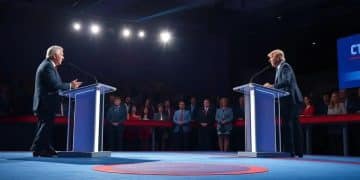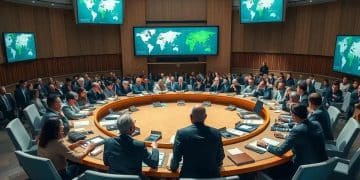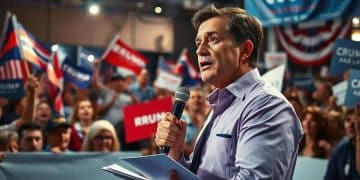serious presidential debate coverage: insights and analysis
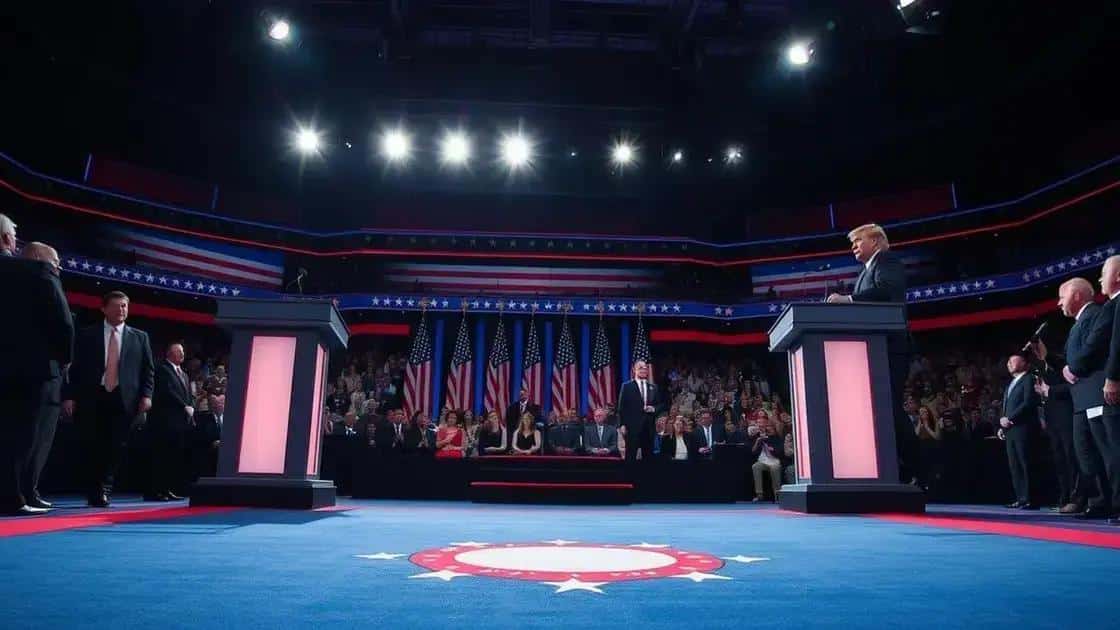
Serious presidential debate coverage significantly impacts public opinion, highlighting key issues and candidates’ performances while shaping voter perceptions leading up to the election.
Serious presidential debate coverage offers a critical lens through which voters can assess candidates. Have you ever wondered how these debates shape electoral outcomes? Let’s dive into the details.
key moments from the debate
During every presidential debate, there are key moments that capture the audience’s attention and highlight the candidates’ perspectives. These moments often shape public perception and can influence the direction of the campaign.
Highlights from the Latest Debate
This recent debate was no exception. Candidates engaged in spirited exchanges, making critical points while challenging one another. The audience was viscerally involved, reacting to the claims and counterclaims made on stage.
Significant Exchanges
Some of the most significant exchanges included:
- Direct challenges on policy differences.
- Emotional appeals to voters’ concerns.
- Moments of unexpected humor that broke the tension.
These interactions not only entertained the viewers but also served to illustrate where candidates stand on pressing issues.
As the debate progressed, many viewers found themselves reflecting on the candidates’ tone of speech and body language. These non-verbal cues often convey more than words alone. For example, gestures and expressions can signal authenticity or defensiveness.
The Audience’s Reaction
Audience reactions also play a pivotal role. Gasps, laughter, and applause during key moments can amplify a candidate’s message. Observing how the audience reacts provides insight into which moments resonate most.
On social media, viewers began discussing these pivotal moments almost instantly. Clips highlighting significant exchanges quickly made their way across platforms, further influencing perceptions.
In summary, key moments in the debate are not merely noise; they can have lasting impacts on voter sentiment and the overall race. Recognizing these moments helps us understand the dynamics of the electoral process.
analysis of candidates’ performances
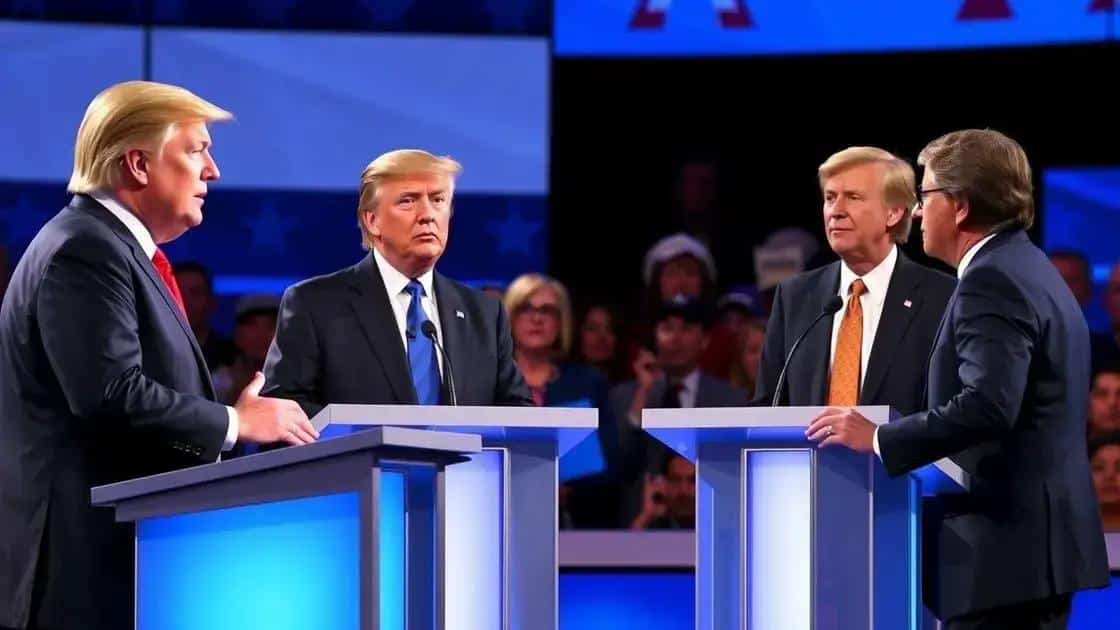
The analysis of candidates’ performances during a presidential debate reveals critical insights into their capabilities and approach to leadership. Each candidate presents their views and defends their positions while trying to connect with voters.
Key Performance Indicators
When analyzing performances, several factors should be considered:
- Clarity of message: How well does the candidate communicate their ideas?
- Response to criticism: Do they handle attacks gracefully?
- Engagement with the audience: Are they effective in connecting emotionally?
Each factor plays a significant role in determining how a candidate is perceived by the public.
Throughout the debate, the way candidates interact with each other can also influence their standings. A strong debater might successfully challenge opponents, showcasing both confidence and knowledge. Conversely, a candidate who struggles to articulate their views may lose credibility.
Body Language and Delivery
Another important aspect is their body language. It can communicate honesty or, in some cases, insecurity. Observers often catch nuances such as:
- Distinct gestures that emphasize points.
- Facial expressions conveying emotion.
- Posture indicating confidence or hesitation.
These non-verbal cues frequently enhance or detract from what is said verbally, making them crucial to the overall performance assessment.
As candidates answer questions, their ability to stay on message while addressing challenges reflects their preparedness and strategic thinking. Viewers analyze how persuasive they are, particularly in moments of challenge. Did the candidate pivot effectively? Did they provide satisfactory answers?
After the debate, political analysts often dissect these performances to predict future trends. They highlight what went well and areas for improvement. This post-debate analysis shapes public narrative and can influence voter opinions leading up to the election.
impact on public opinion
The impact on public opinion during and after presidential debates is profound and can significantly alter the trajectory of a campaign. Debates provide a platform where candidates showcase their policies and personalities directly to voters.
Shifts in Voter Perception
Following a debate, polls often reflect immediate changes in voter attitudes. Candidates can gain or lose support based on their performance. This shift can be attributed to several factors:
- Effective communication of key issues.
- Memorable quotes or moments that resonate.
- Ability to address concerns that matter to voters.
As voters watch the debates, their opinions can change quickly. A strong performance can lead undecided voters to feel more confident in one candidate over another.
Social Media Amplification
Social media plays a crucial role in shaping public opinion after a debate. Many viewers share their thoughts, reactions, and favorite moments online. This digital dialogue can amplify specific messages or incidents. For example, hashtags can trend, drawing attention to certain candidates or statements that provoke discussion.
Furthermore, the reaction of influencers and commentators can sway opinions. When respected figures endorse a candidate after a debate, it can enhance credibility and influence undecided voters.
Negative performances also lead to discussions, as critics and supporters alike analyze what went wrong. This discourse can generate buzz that raises questions about a candidate’s viability.
Long-term Effects
The effects of a debate on public opinion often extend beyond immediate voter reaction. Historical trends indicate that debates contribute to shaping the overall narrative of a campaign. As voters reflect on candidates, they also integrate debate performances into their perceptions over time.
Voting patterns in subsequent polls can illustrate lasting changes. Voter memories of specific moments or arguments shape their choices as Election Day approaches. Debates may also set the agenda for future discussions by highlighting critical issues, prompting candidates to clarify their positions.
what to expect in future debates
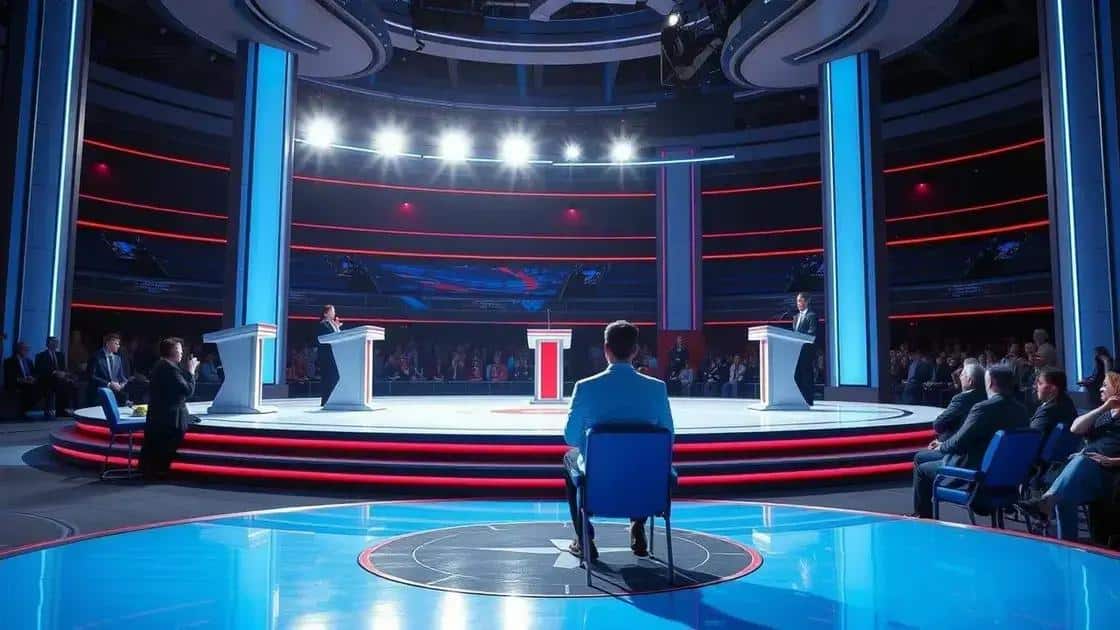
Knowing what to expect in future debates can help voters prepare for the upcoming political discussions. Each debate tends to build on the last, often focusing on the most pressing issues at that time. Candidates will likely refine their messages and strategies based on their previous performances.
Key Topics and Issues
Future debates are expected to highlight several important issues that resonate with the electorate. Here are some topics likely to dominate:
- Health care policy and reforms.
- Economic growth and job creation.
- Climate change initiatives.
- Education funding and reforms.
As these issues gain attention in the media, candidates will tailor their messages to speak directly to voter concerns.
Debate Format Changes
Debate formats may also vary, including town halls or panel discussions. Each format encourages different types of interaction, allowing voters to engage with candidates more personally. Candidates may be pressed for specific solutions rather than general statements, leading to more substantive discussions.
Candidates are likely to adjust their strategies in anticipation of potential challenges. They may practice responses to tough questions, particularly on controversial subjects. This preparation helps them communicate their positions clearly and confidently.
Audience Engagement
Expect audience interaction to play a larger role in future debates. Candidates may face real-time questions from voters, providing a direct way to address concerns. Social media will continue to amplify these interactions, making it crucial for candidates to remain agile in their responses.
The reactions from the audience, both in-person and online, will likely be measured more closely. Candidates need to be aware of how they come across in real-time and may gauge public sentiment through instant polls during the debate.
As the election approaches, keeping an eye on candidates’ preparations and expectations will be important. Voters can gain insights into the candidates’ priorities and plans by watching these debates, shaping their decisions for the upcoming election.
FAQ – Frequently Asked Questions about Presidential Debates
What are the key topics expected in future debates?
Future debates are likely to focus on pressing issues such as health care, the economy, climate change, and education reforms.
How does audience interaction play a role in debates?
Audience interaction can include real-time questions and reactions, which allow candidates to engage directly with voter concerns.
What strategies do candidates use to improve their performances in debates?
Candidates often tailor their messages, practice responses to potential criticisms, and work on their body language to connect better with the audience.
How do debates impact public opinion before an election?
Debates can significantly shift public opinion by highlighting candidates’ strengths and weaknesses, influencing voters’ decisions as Election Day approaches.

